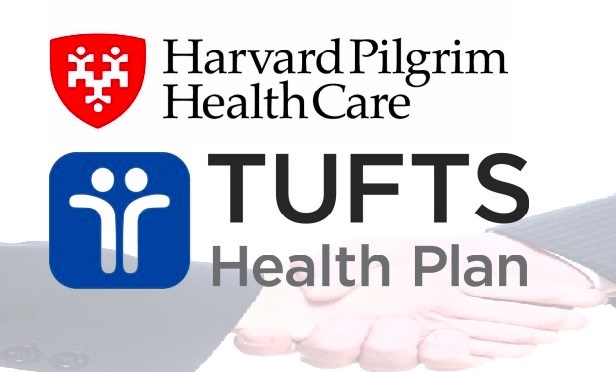 Executives at the carriers say they believe the combined organization would get more out of its administrative spending, be big enough to negotiate better deals, and have more money it could invest. Credit: Allison Bell/ALM)
Executives at the carriers say they believe the combined organization would get more out of its administrative spending, be big enough to negotiate better deals, and have more money it could invest. Credit: Allison Bell/ALM)
Two of the nonprofit, Boston-area carriers that helped to create the modern managed care industry say they intend to merge.
Harvard Pilgrim Health Care Inc. and Tufts Health Plan announced today that their boards have approved a definitive agreement that calls for the organizations to join together under one name.
The carriers say they have not yet chosen the new name.
Related: Drugmakers AbbVie and Allergan strike $63M merger deal
Executives at the carriers say they believe the combined organization would get more out of its administrative spending, be big enough to negotiate better deals, and have more money it could invest in new customer service tools and capabilities.
Together, the two carriers now have about $8.4 billion in annual premium revenue and 2.4 million major medical plan enrollees in Connecticut, Maine, Massachusetts, New Hampshire and Rhode Island.
The companies
Harvard Pilgrim Health Care is a Wellesley, Massachusetts-based carrier that’s descended from a managed care company formed in 1969.
The carrier reported $80 million in net income for 2018 on $3 billion in revenue.
The carrier provided or administered major medical coverage for 1.2 million people. Annual revenue averaged about $2,500 per enrollee.
Harvard Pilgrim broke off merger talks with Partners HealthCare, a large Massachusetts hospital organization, in November 2018.
Harvard Pilgrim put its for-profit entities in a Delaware C corporation, New HPHC Holding Corp., in 2016, according to a 2018 health annual statement filed with Maine in February..
The for-profit subsidiaries include a care management company, an insurance broker, and a company that writes health insurance in Connecticut, Maine and New Hampshire as well as in Massachusetts.
Harvard Pilgrim has been a member of the Federal Home Loan Bank of Boston since April 2015, and it has the ability to borrow up to $60 million from that organization.
The carrier has reinsurance with a $1.5 million deductible for most enrollees states, but with a $1 million deductible for enrollees in Maine, and a $1 million deductible for Medicare plan enrollees.
Tufts Health Plan is a Watertown, Massachusetts-based carrier formed in 1979.
The carrier reported $36 million in net income for 2018 on $5.4 billion in revenue.
The carrier provided or administered major medical coverage for 1.1 million people. Annual revenue averaged $4,800 per enrollee.
The competitive landscape
Harvard Pilgrim and Tufts Health Plan have a big presence on the Boston area, and they have been leaders in starting and shaping organizations such as the National Committee for Quality Assurance, an organization that works to measure the quality of health plans.
But a health plan financial report released by the Massachusetts Medical Society shows that the carriers are trail far behind Blue Cross and Blue Shield of Massachusetts in terms of market share.
Massachusetts Blue has about 2.8 million Massachusetts enrollees.
The proposed Harvard Pilgrim-Tufts Health Plan combination would have about 1.3 million Massachusetts enrollees. The combined organization would be much bigger than third-ranked plan, which is affiliated with Boston Medical Center, but much smaller than Massachusetts Blue.
The combined organization could also eventually face competition from Haven Healthcare, a nonprofit carrier Amazon, Berkshire Hathaway and JPMorgan Chase are forming. That carrier will be based in Boston and could come to life with about 1.2 million “AmBerMorg” employees and dependents as enrollees. The enrollees would be located in offices scattered around the United States.
The deal
Harvard Pilgrim and Tufts Health Plan are presenting the deal as a true merger of equals.
They say that:
- “The board of directors will comprise equal representation from both organizations.”
- The board chair will be Joyce Murphy, who now serves as Harvard Pilgrim’s board chair.
- The chief executive officer will be Tom Croswell, the president and CEO of Tufts Health Plan.
- The president will be Michael Carson, who serves as president and CEO of Harvard Pilgrim.
Many other proposed health carrier mergers and acquisitions have fallen through in the past.
Getting the necessary regulatory approvals for deals involving nonprofit organizations can be especially tricky.
Harvard Pilgrim and Tufts Health Plan note that their combination agreement “is subject to multiple local and federal regulatory approvals.”
Read more:
© 2025 ALM Global, LLC, All Rights Reserved. Request academic re-use from www.copyright.com. All other uses, submit a request to [email protected]. For more information visit Asset & Logo Licensing.







